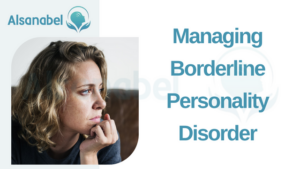Complexities of Borderline Personality Disorder 2023
- Category ADHD
Understanding Borderline Personality Disorder
Borderline Personality Disorder (BPD) is a mental health condition characterized by extreme emotional instability, difficulty in forming and maintaining healthy relationships, and a distorted sense of self. People with BPD often experience intense fear of abandonment, leading to impulsive and self-destructive behaviors. This disorder affects approximately 1.6% of the adult population and is more common in women than men.
Common Symptoms of Borderline Personality Disorder
- Emotional Instability: Individuals with BPD often experience intense and rapidly changing emotions. They may go from feeling intense joy to deep sadness or anger within a short period, making it challenging for them to regulate their emotions effectively.
- Unstable Relationships: People with BPD may have difficulty maintaining stable relationships due to their fear of abandonment. They may exhibit extreme behaviors such as idealizing and idolizing someone one moment and then devaluing and pushing them away the next.
- Impulsive Behaviors: Individuals with BPD may engage in impulsive behaviors such as reckless spending, substance abuse, self-harm, or risky sexual behavior. These behaviors are often attempts to alleviate emotional distress or escape feelings of emptiness.
- Identity Disturbance: Those with BPD often struggle with a fragmented sense of self, feeling uncertain about their values, goals, or even their own personality. This instability can lead to feelings of emptiness and a lack of a clear sense of identity.
- Intense Anger: Individuals with BPD may display extreme anger or have difficulty managing anger appropriately. They may experience outbursts of rage or engage in self-destructive behaviors when feeling threatened or abandoned.
While these symptoms can be challenging to manage, it is important to remember that with the right support and treatment, individuals with BPD can lead fulfilling lives. Seeking professional help, such as therapy and medication, can significantly improve symptom management and overall well-being for individuals with BPD.
Causes and Risk Factors

Genetic and Environmental Factors
The development of Borderline Personality Disorder (BPD) is influenced by a combination of genetic and environmental factors. Research suggests that there is a genetic predisposition to the disorder, as BPD often runs in families. Certain gene variations may affect how individuals regulate emotions and interact with others, increasing their vulnerability to developing BPD.
Environmental factors also play a significant role in the development of BPD. Childhood experiences, such as trauma, neglect, abuse, or unstable family dynamics, can contribute to the development of the disorder. These experiences can disrupt the development of healthy coping mechanisms and interpersonal skills, leading to emotional dysregulation and relationship difficulties in adulthood.
The Role of Childhood Trauma in Borderline Personality Disorder
Childhood trauma is a key risk factor for the development of BPD. Studies have found that individuals with BPD often have a history of significant childhood trauma, such as physical, sexual, or emotional abuse. These traumatic experiences can profoundly impact a person’s sense of self and their ability to form and maintain healthy relationships.
Childhood trauma can affect the developing brain, leading to alterations in the regions responsible for emotional regulation and impulse control. It can also contribute to the formation of negative core beliefs about oneself and the world, which influence how individuals with BPD perceive and interpret their experiences.
It is crucial to acknowledge the complexities of BPD and understand the underlying factors that contribute to its development. By recognizing the role of genetic predisposition and childhood trauma, healthcare professionals can provide targeted interventions that address the unique needs of individuals with BPD. With appropriate support and treatment, individuals with BPD can manage their symptoms, improve their emotional well-being, and build fulfilling lives.
Understanding Borderline Personality Disorder 2023
Diagnosis and Treatment
Diagnostic Criteria for Borderline Personality Disorder
Borderline Personality Disorder (BPD) is a complex mental health condition that can have a significant impact on individuals’ lives. The diagnosis of BPD is based on specific criteria outlined in the Diagnostic and Statistical Manual of Mental Disorders (DSM-5). Healthcare professionals use these criteria to assess whether an individual meets the necessary criteria for a BPD diagnosis. Some of the key diagnostic criteria for BPD include:
- Emotional Instability: Individuals with BPD often experience intense and rapidly shifting emotions, which can lead to emotional dysregulation and difficulty in maintaining stable relationships.
- Impulsive Behavior: Impulsive behaviors, such as self-harm, substance abuse, reckless driving, or binge eating, are common in individuals with BPD.
- Unstable Sense of Self: People with BPD may struggle with an unstable or unclear sense of self, leading to feelings of emptiness, identity disturbance, and difficulty establishing a coherent self-identity.
- Chaotic Interpersonal Relationships: Individuals with BPD often struggle with maintaining stable and healthy relationships, experiencing intense fear of abandonment, and engaging in patterns of idealization and devaluation.
Therapeutic Approaches for Borderline Personality Disorder
Treating BPD requires a comprehensive and individualized approach that addresses the complexities of this disorder. Several therapeutic interventions have shown effectiveness in managing BPD symptoms and promoting recovery. Some commonly used therapeutic approaches for BPD include:
- Dialectical Behavior Therapy (DBT): DBT is a specialized form of therapy that focuses on enhancing emotional regulation, developing distress tolerance skills, improving interpersonal effectiveness, and promoting mindfulness. It can help individuals with BPD manage their emotions and improve their overall functioning.
- Schema Therapy: Schema therapy targets long-standing patterns and beliefs that contribute to BPD symptoms. By identifying and challenging maladaptive schemas, individuals can develop healthier coping mechanisms and establish more fulfilling relationships.
- Mentalization-Based Therapy (MBT): MBT focuses on improving individuals’ ability to understand their own and others’ mental states. It aims to enhance their capacity for empathy, self-reflection, and interpersonal understanding.
- Medication: Medication may be prescribed to manage specific symptoms associated with BPD, such as depression, anxiety, or impulsive behavior. However, medication alone is not considered a primary treatment for BPD and is often used in conjunction with psychotherapy.
It is important to note that treatment strategies may vary depending on the individual’s unique needs and goals. A collaborative and holistic approach involving psychotherapy, medication, and support from healthcare professionals is crucial for managing BPD symptoms and promoting long-term recovery.
Managing Borderline Personality Disorder
Borderline Personality Disorder (BPD) is a complex mental health condition that requires a comprehensive approach for effective management. Individuals with BPD often struggle with intense emotions, impulsivity, and unstable relationships. Here are some key aspects of managing BPD:

Developing Coping Skills and Emotional Regulation
One of the core challenges faced by individuals with BPD is emotional instability. Developing coping skills and emotional regulation strategies can be invaluable. Therapeutic approaches such as Dialectical Behavior Therapy (DBT) can teach individuals skills to manage and regulate their emotions effectively. This includes techniques like mindfulness, distress tolerance, and interpersonal effectiveness. Learning these skills empowers individuals with BPD to navigate challenging emotions and avoid impulsive actions that may exacerbate their condition.
Building Healthy Relationships
Individuals with BPD often have difficulties maintaining stable and healthy relationships. Therapy can help individuals address underlying issues that contribute to chaotic interpersonal dynamics. Building healthy relationships involves developing effective communication skills, setting boundaries, and recognizing patterns of idealization and devaluation. With therapy, individuals can learn to form more stable and fulfilling relationships, reducing the emotional turmoil often associated with BPD.
It is important to note that managing BPD requires a collaborative approach involving therapists, psychiatrists, and other healthcare professionals. In some cases, medication may be prescribed to target specific symptoms, such as depression or anxiety. However, medication is typically used in conjunction with therapy and is not considered a standalone treatment for BPD.
By developing coping skills, learning emotional regulation techniques, and building healthy relationships, individuals with BPD can experience improved quality of life and greater stability. It is crucial to seek professional help and support to navigate the complexities of BPD and work towards long-term recovery.
Challenges and Stigma
The Impact of Stigma on Individuals with Borderline Personality Disorder
Individuals with Borderline Personality Disorder (BPD) not only face the challenges of managing their symptoms but also have to battle against societal stigma. This stigma often arises from misunderstandings and misconceptions about the disorder. The impact of stigma on individuals with BPD can be detrimental to their well-being, making it even more challenging to seek help and support.
The stigma surrounding BPD can lead to feelings of shame, guilt, and self-blame, which can exacerbate the already intense emotions experienced by individuals with the disorder. The negative attitudes and discrimination they encounter may discourage them from accessing appropriate treatment, leading to delays in diagnosis and hindered recovery.
Challenges Faced in Daily Life
Living with BPD presents various challenges in daily life that can significantly impact an individual’s well-being. Some of the key challenges faced by individuals with BPD include:
- Emotional Instability: Intense and rapidly shifting emotions can make it challenging to navigate and regulate one’s feelings effectively.
- Impulsivity: Impulsive behavior, such as engaging in risky activities or self-harm, can have severe consequences and further exacerbate the individual’s distress.
- Unstable Relationships: Difficulties in maintaining stable and healthy relationships can lead to a sense of isolation and contribute to feelings of loneliness and abandonment.
- Self-Identity and Self-Worth: Individuals with BPD often struggle with an unstable sense of self and low self-esteem, which can impact their overall self-image and decision-making.
- Co-occurring Mental Health Conditions: BPD is frequently accompanied by other mental health conditions, such as depression, anxiety, or substance abuse, which can complicate the management and treatment of the disorder.
It is essential to recognize and address these challenges through a comprehensive and individualized approach, including therapy, medication (if necessary), and support from healthcare professionals and loved ones. By promoting understanding and reducing stigma, individuals with BPD can receive the understanding and care they need to lead fulfilling lives.
Support and Resources

Finding the Right Support Network
When it comes to dealing with the complexities of Borderline Personality Disorder (BPD), having a strong support network is crucial. Here are some ways individuals with BPD can find the right support:
- Professional Help: Seek help from trained mental health professionals such as psychiatrists, psychologists, and therapists who specialize in BPD. They can provide guidance, therapy, and treatment options tailored to individual needs.
- Support Groups: Joining support groups, either in-person or online, can provide a sense of community and help individuals connect with others who understand their experiences. These groups offer a safe space to share struggles, exchange coping strategies, and receive emotional support.
- Family and Friends: Educate your loved ones about BPD so they can better understand and support you. Open and honest communication is essential in fostering a supportive environment. Encourage them to participate in family therapy sessions if necessary.
- Self-Help Resources: Utilize self-help resources such as books, websites, and apps that provide information, coping techniques, and mindfulness exercises specifically designed for individuals with BPD.
Helpful Resources for Borderline Personality Disorder
There are several resources available that can provide valuable information and support for individuals with BPD. Some examples include:
- National Education Alliance for Borderline Personality Disorder (NEABPD): This organization offers educational materials, online resources, and support groups for individuals with BPD and their families. They also provide training for mental health professionals.
- Borderline Personality Disorder Resource Center: Run by the New York-Presbyterian Hospital, this resource center offers comprehensive information on BPD symptoms, treatment options, and coping strategies.
- Mindfulness-Based Therapies: Practices such as Dialectical Behavior Therapy (DBT) and Mentalization-Based Therapy (MBT) have shown to be effective in managing BPD symptoms. Finding therapists or programs that specialize in these therapies can be beneficial.
- BPD-focused Websites and Forums: Websites like Verywell Mind, Psych Central, and BPD Central provide articles, forums, and resources specific to BPD. These platforms offer insights, personal stories, and advice from experts and individuals with lived experiences.
Remember, each person’s journey with BPD is unique. It’s important to find the right combination of support and resources that work best for you. With the right support network and access to helpful resources, individuals with BPD can navigate the complexities of the disorder and lead fulfilling lives.
Promoting Understanding and Compassion for Borderline Personality Disorder
To promote understanding and compassion for individuals with BPD, it is important to address common misconceptions and stereotypes surrounding this condition. Educating ourselves and others about BPD can help dispel myths and foster a more empathetic attitude.
Support networks play a vital role in providing individuals with BPD the necessary resources and emotional support to navigate their journey. Mental health professionals specializing in BPD can offer therapy, treatment options, and guidance tailored to individual needs. Support groups, both in-person and online, provide a safe space for individuals to share their experiences, exchange coping strategies, and receive validation and understanding from others who can relate.
Involving family and friends in the support process is also crucial. Educating loved ones about BPD helps them better understand the condition and provides a foundation for open and honest communication. Engaging in family therapy sessions can strengthen relationships and foster a supportive environment.
Additionally, self-help resources such as books, websites, and apps specifically designed for individuals with BPD can provide valuable information, coping techniques, and mindfulness exercises. These resources empower individuals to take an active role in their recovery journey.
By promoting understanding and compassion for BPD, we can help reduce stigma, increase access to proper care, and create a more supportive environment for individuals living with this complex condition. Through education, empathy, and support, we can make a meaningful difference in the lives of those affected by BPD.









